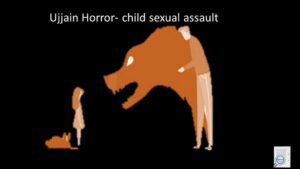Table of Contents
INTRODUCTION
Ujjain Horror – A 12-year-old girl was found bleeding in a street in Central India’s Madhya Pradesh state’s Ujjain, a city of religious significance located about 200 km west of the state capital Bhopal, and 775 km south of New Delhi. The girl’s medical examination confirmed that she survived a sexual assault.
A case of rape has been registered against the accused under the POCSO Act
Ujjain Horror
The priest, Rahul Sharma, is associated with an ashram at Badnagar Road in Ujjain, ho rescued the wandering 12-year-old rape survivor. According to him, he spotted the girl, who was semi-naked and visibly injured with blood dripping down both her legs near the gates of the ashram when he was leaving the premises.
He said “I gave her my clothes. She was bleeding. She could not speak. Her eyes were swollen. I called 100. When I could not reach the cops over the helpline, I contacted the Mahakal police station and informed them about the situation. Police reached the ashram in about 20 minutes.
Police arrived at the scene and took her to the district hospital where a medical examination confirmed rape.
The girl was then referred to Indore as her injuries were serious.
Police personnel also came forward to donate blood when she needed it during her treatment. Her condition is now learned to be stable.

A case of rape has been registered against the accused under the Protection of Children from Sexual Offences (POCSO) Act.
Protection of Children from Sexual Offences Act
POCSO Act came into effect on 14th November 2012 which was enacted in consequence of India’s ratification of the UN Convention on the Rights of the Child in 1992. The aim of this special law is to address offences of sexual exploitation and sexual abuse of children, which were either not specifically defined or adequately penalized. The Act defines a child as any person below the age of 18 years. The Act provides punishment as per the gravity of offence.
Salient features of the POCSO Act
- “Children” according to the Act are individuals aged below 18 years. The Act is gender-neutral.
- Different forms of sexual abuse including but not limited to sexual harassment, pornography, and penetrative & non-penetrative assault are defined in the Act.
- Sexual assault is deemed to be “aggravated” under certain circumstances such as when the child is mentally ill. Also when the abuse is committed by a person in a position of trust such as a doctor, teacher, policeman, or family member.
- Adequate provisions are made to avoid re-victimization of the Child at the hands of the judicial system. The Act assigns a policeman to the role of child protector during the investigation process.
- The Act stipulates that such steps must be taken which makes the investigation process as child-friendly as possible and the case is disposed of within one year from the date of reporting of the offence.
- The Act provides for the establishment of Special Courts for the trial of such offences and matters related to them.
- Under section 45 of the Act, the power to make rules lies with the central government.
- To monitor the implementation of the Act, the National Commission for the Protection of Child Rights (NCPCR) and State Commissions for the Protection of Child Rights (SCPCRs) have been made the designated authority. Both are statutory bodies.
- Section 42 A of the Act provides that in case of inconsistency with provisions of any other law, the POCSO Act shall override such provisions.
12 key principles of the POCSO Act
- Right to life and survival – A child must be shielded from any kind of physical, psychological, mental and emotional abuse and neglect
- Best interests of the child – The primary consideration must be the harmonious development of the child
- Right to be treated with dignity and compassion – Child victims should be treated in a caring and sensitive manner throughout the justice process
- Right to be protected from discrimination – The justice process must be transparent and just; irrespective of the child’s cultural, religious, linguistic, or social orientation
- Right to special preventive measures – It suggests, that victimized children are more likely to get abused again, thus, preventive measures and training must be given to them for self-protection
- Right to be informed – The child victim or witness must be well informed of the legal proceedings
- Right to be heard and to express views and concerns – Every child has the right to be heard in respect of matters affecting him/her
- Right to effective assistance – financial, legal, counseling, health, social,and educational services, physical and psychological recovery services, and other services necessary for the child‟s healing must be provided
- Right to Privacy – The child’s privacy and identity must be protected at all stages of the pre-trial and trial process
- Right to be protected from hardship during the justice process – Secondary victimization or hardships for a child during the justice procedure must be minimized
- Right to safety – A child victim must be protected before, during, and after the justice process
- Right to compensation – The child victim may be awarded compensation for his/her relief and rehabilitation
Child sexual abuse was prosecuted under the following sections of the Indian Penal Code I.P.C. (1860) 375- Rape I.P.C. (1860) 354- Outraging the modesty of a woman I.P.C. (1860) 377- Unnatural offences
However, such a measure had drawbacks since IPC could not effectively protect the child due to various loopholes like:
- IPC 375 doesn’t protect male victims or anyone from sexual acts of penetration other than “traditional” peno-vaginal intercourse.
- IPC 354 lacks a statutory definition of “modesty”. It carries a weak penalty and is a compoundable offence. Further, it does not protect the “modesty” of a male child.
Must Read
WHAT IS THE FIRST INFORMATION REPORT (FIR)?
